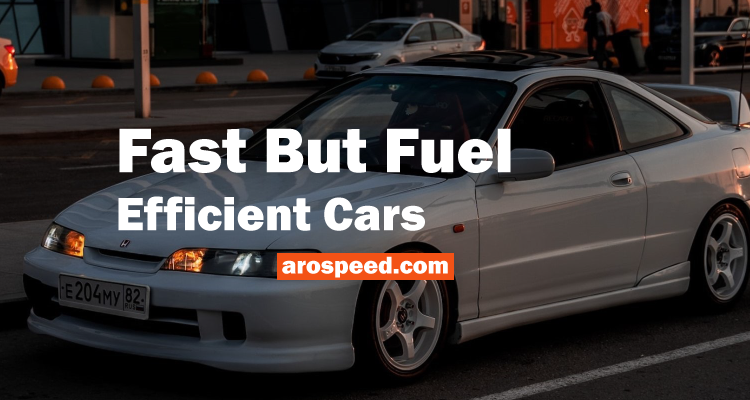In an era where automotive enthusiasts crave both speed and efficiency, the market has witnessed a surge in the development of fast but fuel efficient cars. Striking the perfect balance between performance and environmental consciousness, these vehicles redefine the traditional notion that speed and fuel efficiency are mutually exclusive. In this article, we will delve into the world of fast but fuel efficient cars that exemplify this fusion, discussing their innovative technologies, design features, and the driving experience they offer.
| Car Model | Fuel Efficiency | Engine Type | Powertrain | Key Features |
| Tesla Model S Plaid | Electric (EV) | Electric | Dual Motor, Long Range | Accelerates 0-60 mph in mind-blowing time, Long electric range |
| Porsche Taycan | Electric (EV) | Electric | Dual Motor, AWD | Porsche’s iconic design, Instantaneous acceleration |
| BMW M340i xDrive | Gasoline | Inline-six | Intelligent AWD, Turbocharged | Sporty sedan, Dynamic driving experience |
| Audi RS6 Avant | Gasoline Hybrid | V8 Engine + Electric Motor | Mild-hybrid technology | High-performance station wagon, Cylinder deactivation |
| Chevrolet Corvette Stingray | Gasoline | V8 Engine | Active Fuel Management | Mid-engine layout, Advanced aerodynamics |
| Ford Mustang Mach-E GT | Electric (EV) | Electric | Dual Motor, AWD | Electric SUV with Mustang spirit, Thrilling driving experience |
| Subaru WRX | Gasoline | Turbocharged Boxer Engine | Symmetrical AWD | Rally-inspired performance, All-weather capability |
| Lexus LC 500h | Hybrid | V6 Engine + Electric Motor | Self-Charging Hybrid | Luxury grand tourer, Sophisticated design |
| Nissan GT-R | Gasoline | Twin-Turbo V6 Engine | Advanced aerodynamics | Legendary sports car, Fuel-efficient for its class |
| Mercedes-AMG E63 S | Gasoline | V8 Engine | 4MATIC+ AWD, Cylinder Deactivation | High-performance luxury sedan, Intelligent all-wheel-drive system |
Table of Contents
The Quest Fast But Fuel Efficient Cars
Historically, high-performance cheap cars were often synonymous with gas-guzzlers, consuming fuel at an alarming rate. However, advancements in automotive technology and a growing emphasis on environmental sustainability have prompted manufacturers to engineer vehicles that deliver exceptional speed without compromising fuel efficiency.
Tesla Model S Plaid
Leading the pack in the electric vehicle (EV) category is the Tesla Model S Plaid. Tesla, known for pushing the boundaries of electric mobility, has crafted a car that not only accelerates from 0 to 60 mph in a mind-blowing time but also does so with minimal impact on the environment. The Model S Plaid is a testament to the capabilities of electric powertrains in delivering exhilarating speed while maintaining an impressive range on a single charge.
Porsche Taycan
Porsche, a brand synonymous with high-performance sports cars, has embraced electrification with the Taycan. This all-electric sedan combines Porsche’s iconic design language with a dual-motor setup, delivering instantaneous acceleration. The Taycan showcases that electric vehicles can be both efficient and thrilling, challenging preconceptions about the limitations of battery-powered cars.
BMW M340i xDrive
For those who appreciate the marriage of speed and fuel efficiency in a more conventional form, the BMW M340i xDrive stands out. This sporty sedan combines BMW’s expertise in performance with an efficient inline-six engine and intelligent all-wheel-drive technology. The result is a car that offers a dynamic driving experience without compromising on fuel economy.
Audi RS6 Avant
The Audi RS6 Avant is a testament to the evolution of the high-performance station wagon. Combining a twin-turbocharged V8 engine with mild-hybrid technology, the RS6 Avant delivers exceptional speed while incorporating fuel-saving features like cylinder deactivation. This blend of power and efficiency makes it a unique and attractive option for enthusiasts who require both speed and practicality.
Chevrolet Corvette Stingray
The Chevrolet Corvette has long been an icon in the world of American sports cars, and the latest Stingray model continues this legacy. With a mid-engine layout and advanced aerodynamics, the Corvette Stingray achieves impressive performance figures. The use of innovative technologies, such as cylinder deactivation and active fuel management, ensures that the car maintains efficiency without compromising its lightning-fast acceleration.
Ford Mustang Mach-E GT
While the Mustang name has been synonymous with powerful, gas-guzzling muscle cars, Ford has embraced the electric future with the Mustang Mach-E GT. This all-electric SUV retains the spirit of the Mustang brand while offering a thrilling driving experience and the environmental benefits of electric propulsion. The Mach-E GT represents a bold step forward for the iconic Mustang lineup.
Subaru WRX
Known for its rally-inspired performance, the Subaru WRX has a loyal fan base that appreciates its combination of speed and all-weather capability. The latest WRX models feature a turbocharged boxer engine and Subaru’s symmetrical all-wheel-drive system, providing an exhilarating driving experience while maintaining reasonable fuel efficiency. The WRX demonstrates that a sporty, all-wheel-drive sedan can be both fast and practical.
Lexus LC 500h
Lexus, Toyota’s luxury division, has successfully blended performance and efficiency in the LC 500h. This grand tourer features a hybrid powertrain that combines a V6 engine with an electric motor, delivering both power and fuel savings. The LC 500h is a testament to Lexus’s commitment to innovative engineering and design, offering a sophisticated and efficient option for those seeking a high-performance luxury car.
Nissan GT-R
The Nissan GT-R, often referred to as “Godzilla,” has a legendary reputation for its impressive performance on the track. Despite being a high-performance sports car, the GT-R incorporates advanced technology to optimize fuel efficiency.
The use of a twin-turbocharged V6 engine and aerodynamic enhancements ensures that the Nissan GT-R maintains its status as a speed demon while being relatively efficient for its class.
Mercedes-AMG E63 S
Mercedes-AMG, the performance arm of Mercedes-Benz, has consistently produced cars that marry luxury with exhilarating performance. The E63 S is no exception, featuring a powerful V8 engine and advanced all-wheel-drive system. The use of cylinder deactivation technology and other fuel-saving measures demonstrates Mercedes-AMG’s commitment to delivering a high-performance driving experience without excessive fuel consumption.
Future of Fast and Fuel-Efficient Cars
As we look toward the future, it’s evident that the automotive industry is on the brink of significant transformations. The rise of electric vehicles (EVs), advancements in hybrid technology, and the pursuit of sustainable mobility are shaping the next generation of fast yet fuel-efficient cars.
Electric Revolution
Electric vehicles have gained immense popularity, and their influence on the high-performance segment is undeniable. Manufacturers are investing heavily in EV technology and, making luxurious cars, also pushing the boundaries of what’s possible in terms of speed and efficiency. Companies like Tesla are at the forefront, continuously refining their electric powertrains to deliver unmatched acceleration and range.
Advancements in Battery Technology
One of the critical factors influencing the speed and efficiency of electric cars is the development of battery technology. The quest for higher energy density, faster charging times, and longer battery life is driving innovation in the industry. Breakthroughs in solid-state battery technology, for instance, hold the promise of addressing some of the limitations associated with current lithium-ion batteries, further propelling the performance of electric vehicles.
Hybrid Performance
Hybrid technology, combining internal combustion engines with electric power, continues to play a pivotal role in achieving the delicate balance between speed and efficiency. Cars like the Porsche 911 Hybrid and the Ferrari SF90 Stradale showcase the potential of hybrid systems, offering drivers the ability to switch seamlessly between electric-only mode for efficiency and full combustion power for exhilarating performance.
Integration of Artificial Intelligence
The future of fast and fuel-efficient cars also involves the integration of artificial intelligence (AI) into vehicle systems. AI-powered algorithms can optimize performance by dynamically adjusting power delivery, managing energy consumption, and even predicting driving conditions to enhance efficiency. This not only contributes to fuel savings but also ensures a safer and more responsive driving experience.
Environmental Considerations
As the automotive industry shifts towards sustainability, the environmental impact of high-performance cars is under scrutiny. Manufacturers are adopting eco-friendly materials in vehicle construction, exploring ways to reduce carbon footprints in manufacturing processes, and actively engaging in initiatives to offset emissions. The aim is to create a harmonious balance between the thrill of speed and the responsibility of environmental stewardship.
Consumer Demand and Industry Response
Consumer preferences are evolving, with an increasing number of buyers considering fuel efficiency and environmental impact alongside performance when choosing a high-performance car. This shift in demand is prompting manufacturers to prioritize sustainability in their product development strategies. The result is a growing lineup of fast yet fuel-efficient cars that cater to the demands of an environmentally conscious and performance-driven market.
Challenges and Opportunities
While the future looks promising, challenges remain. The infrastructure for electric vehicles, including charging stations and battery recycling systems, needs to expand to support the widespread adoption of EVs. Additionally, manufacturers must navigate the delicate balance between meeting stringent emission standards and delivering the high-performance experiences enthusiasts crave.
However, these challenges present opportunities for innovation and collaboration within the automotive industry. Partnerships between manufacturers, advancements in infrastructure, and continued research into sustainable materials and energy solutions will pave the way for a new era of fast and fuel-efficient cars.
Conclusion
The landscape of fast butt fuel efficient cars is evolving rapidly, driven by a confluence of technological advancements, environmental consciousness, and shifting consumer preferences. The cars discussed in this article are just the tip of the iceberg, representing the current state of innovation in the industry.
As we venture into the future, the integration of electric power, hybrid systems, AI, and sustainable practices will redefine the possibilities for high-performance vehicles. The coming years promise a thrilling era for automotive enthusiasts, where the exhilaration of speed meets the responsibility of sustainable driving. Whether it’s the silent acceleration of an electric sports car or the harmonious hum of a high-performance hybrid, the future of fast and fuel-efficient cars holds the key to a new chapter in automotive history.








Comments